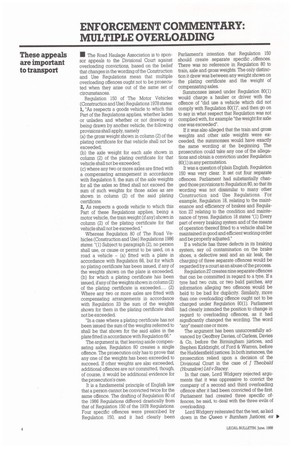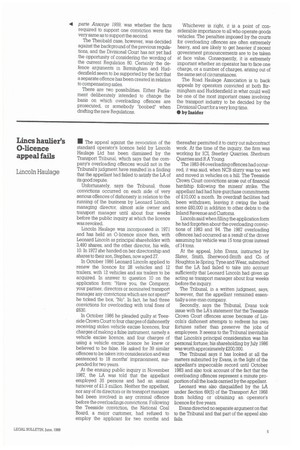These appeals are important to transport
Page 70

Page 71

If you've noticed an error in this article please click here to report it so we can fix it.
• The Road Haulage Association is to sponsor appeals to the Divisional Court against overloading convictions, based on the belief that changes in the wording of the Construction and Use Regulations mean that multiple overloading offences ought not to be prosecuted when they arise out of the same set of circumstances.
Regulation 150 of The Motor Vehicles (Construction and Use) Regulations 1978 states: 1, "As respects a goods vehicle to which this Part of the Regulations applies, whether laden or unladen and whether or not drawing or being drawn by another vehicle, the following provisions shall apply, namely (a) the gross weight shown in column (2) of the plating certificate for that vehicle shall not be exceeded; (b) the axle weight for each axle shown in column (2) of the plating certificate for that vehicle shall not be exceeded; (c) where any two or more axles are fitted with a compensating arrangement in accordance with Regulation 9, the sum of the axle weights for all the axles so fitted shall not exceed the sum of such weights for those axles as are shown in column (2) of the said plating certificate.
2, As respects a goods vehicle to which this Part of these Regulations applies, being a motor vehicle, the train weight (if any) shown in column (2) of the plating certificate for that vehicle shall not be exceeded."
Whereas Regulation 80 of The Road Vehicles (Construction and Use) Regulations 1986 states: "(1) Subject to paragraph (2), no person shall use, or cause or permit to be used, on a road a vehicle (a) fitted with a plate in accordance with Regulation 66, but for which no plating certificate has been issued, if any of the weights shown on the plate is exceeded; (b) for which a plating certificate has been issued, if any of the weights shown in column (2) of the plating certificate is exceeded (2) Where any two or more axles are fitted with compensating arrangements in accordance with Regulation 23 the sum of the weights shown for them in the plating certificate shall not be exceeded.
"In a case where a plating certificate has not been issued the sum of the weights referred to shall be that shown for the said axles in the plate fitted in accordance with Regulation 66."
The argument is, that leaving aside compensating axles, Regulation 80 creates a single offence. The prosecution only has to prove that any one of the weights has been exceeded to succeed. If other weights are also exceeded, additional offences are not committed, though, of course, it would be additional evidence for the prosecution's case.
It is a fundamental principle of English law that a person cannot be convicted twice for the same offence. The drafting of Regulation 80 of the 1986 Regulations differed drastically from that of Regulation 150 of the 1978 Regulations. Four specific offences were prescribed by Regulation 150, and it had clearly been Parliament's intention that Regulation 150 should create separate specific , offences. There was no reference in Regulation 80 to train, axle and gross weights. The only distinction it drew was between any weight shown on the plating certificate and the weight of compensating axles.
Summonses issued under Regulation 80(1) would charge a haulier or driver with the offence of "did use a vehicle which did not comply with Regulation 80(1)", and then go on to say in what respect that Regulation was not complied with, for example "the weight for axle one was exceeded".
If it was also alleged that the train and gross weights and other axle weights were exceeded, the summonses would have exactly the same wording at the beginning. The prosecution could take any one of the allegations and obtain a conviction under Regulation 80(1) in any permutation.
It was a question of plain English. Regulation 150 was very clear. It set out four separate offences. Parliament had substantially changed those provisions to Regulation 80, so that its wording was not dissimilar to many other Construction and Use Regulations. For example. Regulation 18, relating to the maintenance and efficiency of brakes and Regulation 27 relating to the condition and maintenance of tyres. Regulation 18 states "(1) Every part of every braking system and of the means of operation thereof fitted to a vehicle shall be maintained in good and efficient working order and be properly adjusted."
If a vehicle has three defects in its braking system, say oil contamination on the brake shoes, a defective seal and an air leak, the charging of three separate offences would be regarded by a court as an abuse of the process.
Regulation 27 creates nine separate offences that can be committed in regard to a tyre. If a tyre had two cuts, or two bald patches, any information alleging two offences would be held to be bad for duplicity. Similarly, more than one overloading offence ought not to be charged under Regulation 80(1). Parliament had clearly intended the position to change in regard to overloading offences, as it had significantly changed the wording. The word "any" meant one or more.
The argument has been unsuccessfully advanced by Geoffrey Davies, of Carless, Davies & Co, before the Birmingham justices, and Stephen ICirkbright, of Ford & Warren, before the Huddersfield justices. In both instances, the prosecution relied upon a decision of the Divisional Court in the case of I Theobald (Hounslow) Ltd v Stacey.
In that case, Lord Widgery rejected arguments that it was oppressive to convict the company of a second and third overloading offence after it had been convicted of the first. Parliament had created three specific offences, he said, to deal with the three evils of overloading.
Lord Widgery reiterated that the test, as laid down in the Queen v Burnham Justices, ex • parte Ansorge 1959, was whether the facts required to support one conviction were the very same as to support the second.
The Theobald case, however, was decided against the background of the previous regulations, and the Divisional Court has not yet had the opportunity of considering the wording of the current Regulation 80. Certainly the defence arguments in Birmingham and Huddersfield seem to be supported by the fact that a separate offence has been created in relation to compensating axles.
There are two possibilities. Either Parliament deliberately intended to change the basis on which overloading offences are prosecuted, or somebody "boobed" when drafting the new Regulations. Whichever is right, it is a point of considerable importance to all who operate goods vehicles. The penalties imposed by the courts for overloading offences are often extremely heavy, and are likely to get heavier if recent government pronouncements are to be taken at face value. Consequently, it is extremely important whether an operator has to face one charge, or a number of charges, arising out of the same set of circumstances.
The Road Haulage Association is to back appeals by operators convicted at both Birmingham and Huddersfield in what could well be one of the most important cases involving the transport industry to be decided by the Divisional Court for a very long time.
• by Insider
















































































































